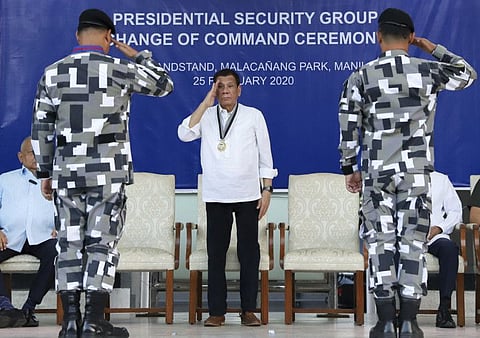US-Philippines defence pact can be salvaged: Envoy
Ambassador to US Romualdez says talks taking place to find a solution

Manila: A US-Philippines troop agreement recently scrapped by President Rodrigo Duterte could still be salvaged, a senior diplomat said on Friday, boosting hopes in both countries of retaining one of Asia’s oldest military alliances.
Talks were taking place to find a solution, but the alliance would prevail, recognising the importance of the United States as a global power, said Jose Manuel Romualdez, Philippine ambassador to Washington.
“From what I’m told, the door is not totally shut,” he told a forum.
Romualdez said both countries were looking at how they can “polish” and “improve” the Visiting Forces Agreement (VFA), with a Philippines troop pact with Australia and a similar agreement in the works with Japan possible templates.
The mercurial Duterte caused a stir earlier this month by serving notice of the VFA’s termination, demonstrating his fury over the rescinding of a US travel visa for his former police chief due to human rights concerns by some US lawmakers.
The VFA, which would end in August, provides rules for the rotation of thousands of American troops in and out of the Philippines for war games and scores of annual exercises.
His opponents were outraged at what they saw as a show of petulance, and some lawmakers who typically side with Duterte urged him to reconsider a move that could weaken an under-resourced military stretched constantly by natural disasters and Maoist and Islamist rebellions.
Philippine efforts to protect the alliance underscore contrasting opinions within the Duterte administration and legislature about his foreign policy trajectory, especially over his openly hostile approach towards the United States, where relatives of millions of Filipinos live.
Absent free movement of US personnel, experts say two other joint defence agreements would be meaningless and efforts to procure and operate US defence hardware could become difficult.
It would also reduce Washington’s options in the Pacific region, with complications over a longstanding US troop presence in Japan and South Korea, and only limited engagements for the US military elsewhere in Southeast Asia.
The other source of foreign policy friction in the Philippines is Duterte’s fondness for China, which many Filipinos view with scepticism due to a history of perceived maritime encroachments.
Retired supreme court judge Antonio Carpio, a staunch critic of China’s efforts to dominate in the South China Sea, said maintaining defence ties with the United States were vital to keeping Beijing in check.
“The only ally we can hope to deter China is the U.S,” he told the forum.


